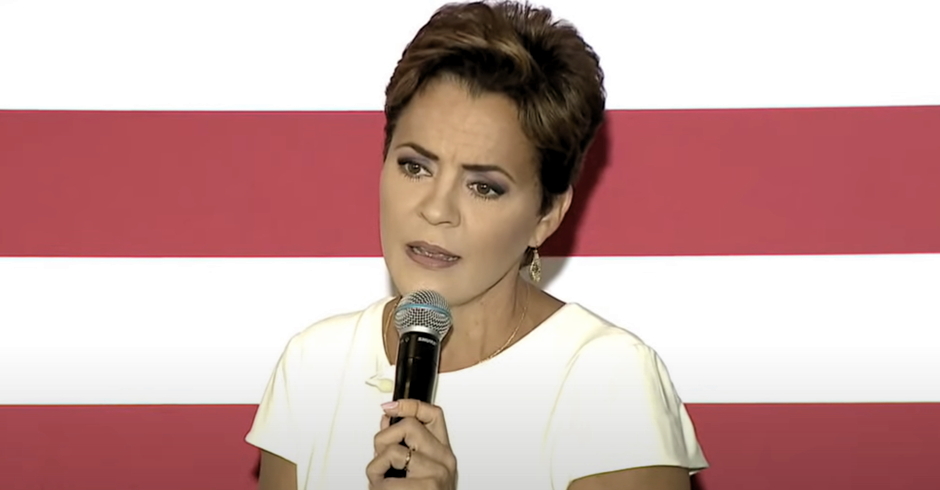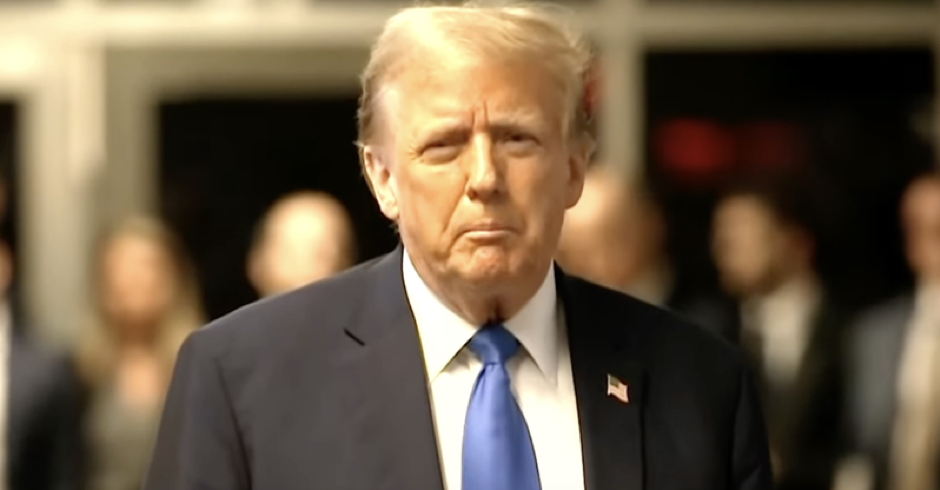A 9/11 Double Mourning
Tanya Domi was a graduate student at Columbia University on September 11, 2001. She was already in mourning when the planes hit the World Trade Center on that fateful day. Those terrible events sealed her identity as a proud New Yorker.
At the 116th Columbia University subway station, the Number 1 and then Number 2 subway train station sign said, “All Trains Slow Today,” written in chalk on a wall board, startling me as I walked past the hurried makeshift sign and up the steps, entering the university ‘s Morningside Heights campus at about 9:25 a.m. on September 11, 2001.
I thought to myself…”that is strange” because I had never seen such a sign before…never. Â It was such a beautiful September fall morning as I walked across bucolic College Walk to the School of International and Public Affairs to attend my Foreign Policies of the Former Soviet Union graduate class. I was in the second-year of my graduate studies in Human Rights following a four-year tour as a State Department contractor working in Bosnia and Herzegovina, where I had contributed to the implementation of the U.S.-brokered Dayton Peace Accords.
I was not a traditional student by any standard measure. And because of my professional background in the military and foreign affairs, I readily knew, more than most Americans that on this day the world as we knew it would be unalterably changed.
Despite my misgivings about the subway sign, I quickly set those feelings aside, to make emotional space, as I was steeped in mourning, reeling from a breakup just two days earlier with my lover. I had once been convinced this was the relationship that I had always longed for — the love of my life with whom I would marry and would live out my days with her to the end.
We had a transnational courtship, initially meeting in Provincetown on Thanksgiving in 1997 while I was in the States for consultations from my State Department posting in Sarajevo. We traveled back and forth for several months meeting for romantic interludes, before she arrived permanently to Bosnia in 1998. It was a whirlwind romance that ended, always to be intertwined and conflated with my 9/11 experience.
I was emotionally crushed. Â Every inch of my body hurt. It hurt to breathe. It hurt to move. I was not sleeping much and there was no escaping the pain
Nonetheless, I persisted, bullish in my plan to obtain a graduate degree. I promised myself that I would attend class religiously, no matter how much I hurt emotionally and physically. I rigorously willed myself to persist in the main occupation of my life, even though I was alone and without intimate friends in New York City.
As I entered the student lounge on the ground floor–a mass of students, 300 or more, were standing shoulder-to-shoulder, straining to watch the televisions affixed to the ceiling.
“What is going on?” I asked a friend, whom I had bonded with during my first year international law class. I was watching the  television as I asked him.  He told me that two planes had flown into the World Trade Center Towers. I immediately said, “Oh my god, that is terrorism! That has to be terrorism!”
Smoke was billowing from one of the towers and I was thinking, “no, this is not a movie!” Cameras panned in on people who were jumping to their deaths. It was an unthinkable, unfathomable and surreal situation.
The TV anchors were reporting there were a number of unaccounted planes still in the air. Then the report came in that the Pentagon was hit. I was thinking, “Oh my god, America is under attack.”
People were flipping their phones on and I turned to look for mine and realized that in the halcyon fog of my breakup, I had left it at home (of all days to leave your phone at home–to be in a national crisis without one–I began to lament my distractions.) Little did I know that for most of the day, cell phone service was nearly non-existent and land-line phones did not resume working until 4:00 p.m.
And then the first tower dropped, as a collective gasp and shrieks ricocheted across the room–the tower seemed to fall in a slow, excruciating motion, as dust and debris blew up and down and filled the sky in darkness. I could not wrap my brain around the surreal images unfolding in real-time. I knew it was very likely few people could survive such a horrendous calamity.
I turned to my friend and said: “New York City will be fine. Giuliani will do his job. But with Bush as president, we are so screwed!”
I knew almost immediately we were witnessing a life altering American moment which would be historically referred to as “before 9/11 and after 9/11.”
I became angry–outraged too, that these terrorists so brazenly attacked my city, New York City, one of the greatest cities in the world. I knew that New York City would rebuild, come back, as it always had done during its illustrious history. New Yorkers are resilient and much more generous than conventionally thought to be. It was in the hours and days after the 9/11 attacks, although I was angry, in shock, and at times, fearful, I absolutely fell in love with New Yorkers. My city and its first responders worked without self-regard, until they could do no more; lay their heads down to nap and then get up and do more.
However, I had no doubt that Bush would take America to war very quickly. I had early concerns about his apparent radical foreign policy agenda that marked a significant departure from previous administrations. My concerns would be borne out in ways that many Americans would find abhorrent. Some would call new Bush initiatives like warrantless wiretaps, fundamentally unconstitutional. It is a debate that continues into the present.
https://youtube.com/watch?v=YndXYIPlmd0%3Fversion%3D3%26hl%3Den_US
Classes were cancelled that day, but I could not get home until later in the evening. Sitting at my university computer, emails began rolling in from Sarajevo, written with great concern from dear friends, particularly. At this peculiar moment in my life, I felt a deep kinship with Sarajevans, who were so strong and loving, having survived a three-year siege of their city. Although America came late to their defense, they fell in love with America and Americans. Now, they were supporting New York City and America, evidenced in their urgent emails to me, and later in September more than 7,000 Sarajevans gathered together to sing Mozart’s Requiem Mass as a tribute to America and the lives that were lost on September 11th.
I staggered home later in the afternoon and watched television non-stop for the duration of the week until I could not bear another second. I learned about the 19 Saudi Arabian hijackers, who learned to fly planes in America, but not to land them, ultimately using them as suicide missiles.
CNN broadcast 24/7 and I watched video repeatedly of the planes flying into World Trade Center, as well as into the Pentagon. By the time the Friday night marathon tribute to the victims and country took place, I was more than ready to return to a reassuring episode of “Law and Order,” which envisaged the capture and arrest of the bad guys, who have been prosecuted and thrown into jail. It was a comforting thought in the midst of total chaos. But my thoughts were a fantasy, a wishful attempt to reclaim the idyllic and innocent America that once existed “before 9/11.”
The next morning, I headed to Harry’s Shoes at 83rd and Broadway to buy a new pair of shoes. Having made my purchase, I exited the store to my cell phone ringing.
On the line was a dear friend from Honolulu, Hawaii, who shared the terrible news that the husband of a mutual friend had been one of the passengers on United Flight 93–the hijacked plane that was successfully brought down in a field in Shanksville, Pennsylvania, by its brave passengers, who thwarted another likely attack on the nation’s capitol or the White House in Washington, D.C.
I began to cry–the week’s terrible events finally had caught up with me. The bravery and sacrifice demonstrated by so many Americans–and some who were not–overwhelmed and touched me deeply. All these events, brought home and reinforced my notions that I consciously wanted to live life to its absolute fullest in the big and small moments, to be kind and show respect for others, to tell those who you love, that you indeed love and care about them everyday and live a mindful and conscious life that imbues gratitude and a zest for life.
Reflecting on all those who went to their deaths that fateful day–who had little, if any time to reflect. But we do, at least for today, which recalls Ralph Waldo  Emerson’s “Thanksgiving” poem, a sweet thought to consider as we reflect:
For each new morning with its light,
For rest and shelter of the night,
For health and food,
For love and friends,
For everything Thy goodness sends.
And may it be so for every day I live to see the morning dawn. After we leave this earth “only love will survive us” (Phillip Larkin.)
(Image (top) of Columbia College Walk)
 Tanya L. Domi is an Adjunct Assistant Professor of International and Public Affairs at Columbia University who teaches about human rights in Eurasia and is a Harriman Institute affiliated faculty member. Prior to teaching at Columbia, Domi worked internationally for more than a decade on issues related to democratic transitional development, including political and media development, human rights, gender issues, sex trafficking, and media freedom.
Tanya L. Domi is an Adjunct Assistant Professor of International and Public Affairs at Columbia University who teaches about human rights in Eurasia and is a Harriman Institute affiliated faculty member. Prior to teaching at Columbia, Domi worked internationally for more than a decade on issues related to democratic transitional development, including political and media development, human rights, gender issues, sex trafficking, and media freedom.

Enjoy this piece?
… then let us make a small request. The New Civil Rights Movement depends on readers like you to meet our ongoing expenses and continue producing quality progressive journalism. Three Silicon Valley giants consume 70 percent of all online advertising dollars, so we need your help to continue doing what we do.
NCRM is independent. You won’t find mainstream media bias here. From unflinching coverage of religious extremism, to spotlighting efforts to roll back our rights, NCRM continues to speak truth to power. America needs independent voices like NCRM to be sure no one is forgotten.
Every reader contribution, whatever the amount, makes a tremendous difference. Help ensure NCRM remains independent long into the future. Support progressive journalism with a one-time contribution to NCRM, or click here to become a subscriber. Thank you. Click here to donate by check.
 |













